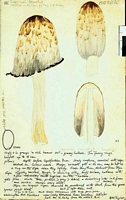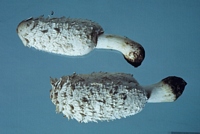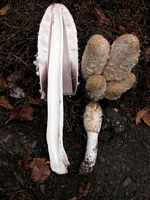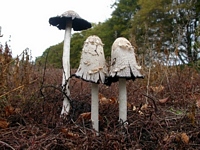|
 Coprinus comatus Coprinus comatus
SynonymsAgaricus comatus
BiostatusPresent in region - Exotic
Images (click to enlarge)
Caption: Watercolour
Owner: G.M. Taylor | 
Owner: Herb. PDD | 
Owner: J.A. Cooper | 
Owner: J.A. Cooper | |
Article: Massee, G.E. (1899) [1898]. The fungus flora of New Zealand. Transactions and Proceedings of the New Zealand Institute 31: 282–349 Wellington:.
Description: Pileus cylindrical, then campanulate, finally expanding and deliquescing, at first even; during
growth and expansion the cuticle becomes torn into broad adpressed or loose scattered scales,
cream-colour, interstices white and silky, 7-12 cm. .high; flesh white, thin except at the apex;
gills almost free, about I cm. broad, crowded, white, then pinkish, at length black; spores
almost black, elliptical, 13-18 x 7-8 µ; stem 18-16 cm. high, 1-2 cm. thick, subequal, white,
even, hollow, more or less bulbous, bulb solid; ring movable on the stem, soon disappearing.
Habitat: Amongst grass, in pastures, waste places near towns, &c. ; not on dung.
Distribution: Northern Island, New Zealand. Australia, Europe, United States.
Notes: A large, fine species, growing in troops, readily distinguished by its large size and cylindrical
form of the whitish shaggy pileus. One of the best and safest of edible fungi.
Article: Horak, E. (1971). A contribution towards the revision of the Agaricales (Fungi) from New Zealand. New Zealand Journal of Botany 9(3): 403-462 (http://www.rsnz.org/publish/abstracts.php).
Notes: Apparently introduced into New Zealand with exotic grass seeds, soil, dung, etc.
|